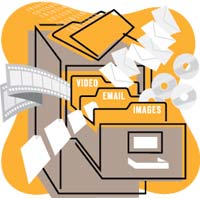The DoD plans to use active RFID on freight containers and consolidated air pallets and will use passive RFID on cases, pallets and packaging on unique identification (UID) items -- items inside the freight containers and air pallets.

There is a lot of Linux talk, but can the OS walk the walk? Tools and utilities are still needed, say experts.
Before Linux was accepted by the IBMs and Oracles of the world, most Linux installations tended to follow the open-source, do-it-yourself model. There, distributions were downloaded, tweaked and then shared with the rest of the open-source community in compliance with the General Public License (GPL) model that regulated its use.
We can learn lessons from trading hubs and apply the data to IT integration. See how the ESB removes the distinction among internal and external networks for supply-chain apps.
A sampling of wireless development tools.

Pervasive? Maybe not yet. But wireless applications are here. Now development teams must sort through a variety of tools and languages to meet the corporation’s need to be mobile.

The action is heating up, but it will take a couple of years for security and other management-related standards to gel and make their way into products.
According to open-source advocates, the model is more responsive because you do not have to wait for vendors to solve bugs. However, for corporate customers, who tend to prefer the assurance of having someone to call at 3 a.m. to fix a problem, the open-source model has little appeal.
Gartner and Cutter Consortium survey users about their plans to implement Web services.

It is a tough row to hoe for those who received Wal-Mart’s
invitation to RFID. What to do with all that “radio” data is the real question.
Your J2EE and .NET apps must interact. This overview presents the standards and available technologies that can help you shape interoperable solutions.
Managers at Relativity say they are participating in standards activity around legacy, but suggest it is worthwhile for customers to move ahead in lieu of fully established transformation standards.
Various J2EE toolmakers have worked in recent years to ease the task of developing for the J2EE platform. Perhaps only a few of their advances have had much effect to date on EJB design, which is for some shops a key part of J2EE.
You can automate exception logging with one line of client code, control it through an App.config file without recompiling, and use custom publishers to craft cool logging tools.
While enterprise content management (ECM) vendors have been bulking up their records management and workflow capabilities, many see portals as another synergistic technology.

There is a growing recognition -- even among the Java faithful -- that it is necessary to simplify the technology to win converts. This will happen with the next version of EJB, Version 3.0.

The Web services sweet spot is still legacy integration because Web services can access data and logic, but performance levels remain an issue.
Over the years, there has been some criticism leveled at the JCP, from things taking too long to various pieces of the Java pie being dominated by a few large vendors (notably Sun and IBM). The JCP is aware of these issues and is working to help smaller companies and individuals take on leadership roles.
A sampling of recent data integration tools.

IT managers see flood of M&A activity as suppliers look for tools that can tackle the full enterprise content management (ECM) life cycle.